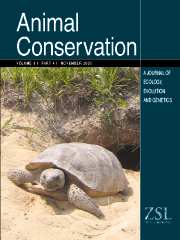Crossref Citations
This article has been cited by the following publications. This list is generated based on data provided by
Crossref.
Colombo, Sergio
Hanley, Nick
and
Calatrava-Requena, Javier
2005.
Designing Policy for Reducing the Off-farm Effects of Soil Erosion Using Choice Experiments.
Journal of Agricultural Economics,
Vol. 56,
Issue. 1,
p.
81.
Jacobsen, Jette Bredahl
Boiesen, John Halfdan
Thorsen, Bo Jellesmark
and
Strange, Niels
2008.
What’s in a name? The use of quantitative measures versus ‘Iconised’ species when valuing biodiversity.
Environmental and Resource Economics,
Vol. 39,
Issue. 3,
p.
247.
Czajkowski, Mikołaj
and
Hanley, Nick
2009.
Using Labels to Investigate Scope Effects in Stated Preference Methods.
Environmental and Resource Economics,
Vol. 44,
Issue. 4,
p.
521.
Bateman, Ian J.
Day, Brett H.
Jones, Andrew P.
and
Jude, Simon
2009.
Reducing gain–loss asymmetry: A virtual reality choice experiment valuing land use change.
Journal of Environmental Economics and Management,
Vol. 58,
Issue. 1,
p.
106.
Jacobsen, Jette Bredahl
and
Hanley, Nick
2009.
Are There Income Effects on Global Willingness to Pay for Biodiversity Conservation?.
Environmental and Resource Economics,
Vol. 43,
Issue. 2,
p.
137.
Bladt, Jesper
Strange, Niels
Abildtrup, Jens
Svenning, Jens-Christian
and
Skov, Flemming
2009.
Conservation efficiency of geopolitical coordination in the EU.
Journal for Nature Conservation,
Vol. 17,
Issue. 2,
p.
72.
Birol, Ekin
Hanley, Nick
Koundouri, Phoebe
and
Kountouris, Yiannis
2009.
Optimal management of wetlands: Quantifying trade‐offs between flood risks, recreation, and biodiversity conservation.
Water Resources Research,
Vol. 45,
Issue. 11,
Ruto, Eric
and
Garrod, Guy
2009.
Investigating farmers' preferences for the design of agri-environment schemes: a choice experiment approach.
Journal of Environmental Planning and Management,
Vol. 52,
Issue. 5,
p.
631.
AKTER, SONIA
and
GRAFTON, R. QUENTIN
2010.
Confronting Uncertainty and Missing Values in Environmental Value Transfer as Applied to Species Conservation.
Conservation Biology,
Vol. 24,
Issue. 5,
p.
1407.
Otieno, David Jakinda
Ruto, Eric
and
Hubbard, Lionel
2011.
Cattle Farmers’ Preferences for Disease‐Free Zones in Kenya: An application of the Choice Experiment Method.
Journal of Agricultural Economics,
Vol. 62,
Issue. 1,
p.
207.
Fisher, Brendan
Turner, R. Kerry
Burgess, Neil D.
Swetnam, Ruth D.
Green, Jonathan
Green, Rhys E.
Kajembe, George
Kulindwa, Kassim
Lewis, Simon L.
Marchant, Rob
Marshall, Andrew R.
Madoffe, Seif
Munishi, P.K.T.
Morse-Jones, Sian
Mwakalila, Shadrack
Paavola, Jouni
Naidoo, Robin
Ricketts, Taylor
Rouget, Mathieu
Willcock, Simon
White, Sue
and
Balmford, Andrew
2011.
Measuring, modeling and mapping ecosystem services in the Eastern Arc Mountains of Tanzania.
Progress in Physical Geography: Earth and Environment,
Vol. 35,
Issue. 5,
p.
595.
Bateman, Ian J.
Mace, Georgina M.
Fezzi, Carlo
Atkinson, Giles
and
Turner, Kerry
2011.
Economic Analysis for Ecosystem Service Assessments.
Environmental and Resource Economics,
Vol. 48,
Issue. 2,
p.
177.
Cook, David C.
Fraser, Rob W.
Waage, Jeffrey K.
and
Thomas, Matthew B.
2011.
Prioritising biosecurity investment between agricultural and environmental systems.
Journal für Verbraucherschutz und Lebensmittelsicherheit,
Vol. 6,
Issue. S1,
p.
3.
Jacobsen, Jette Bredahl
Lundhede, Thomas Hedemark
and
Thorsen, Bo Jellesmark
2012.
Valuation of wildlife populations above survival.
Biodiversity and Conservation,
Vol. 21,
Issue. 2,
p.
543.
Gaaff, Aris
and
Reinhard, Stijn
2012.
Incorporating the value of ecological networks into cost–benefit analysis to improve spatially explicit land-use planning.
Ecological Economics,
Vol. 73,
Issue. ,
p.
66.
Morse-Jones, Sian
Bateman, Ian J.
Kontoleon, Andreas
Ferrini, Silvia
Burgess, Neil D.
and
Turner, R. Kerry
2012.
Stated preferences for tropical wildlife conservation amongst distant beneficiaries: Charisma, endemism, scope and substitution effects.
Ecological Economics,
Vol. 78,
Issue. ,
p.
9.
Ernoul, Lisa
Mesléard, François
and
Béchet, Arnaud
2012.
Diagnostic de l’échec de la contractualisation des mesures agri-environnementales pour réduire les incursions des Flamants dans les rizières de Camargue (France).
VertigO,
ST JOHN, FREYA A. V.
EDWARDS-JONES, GARETH
and
JONES, JULIA P. G.
2012.
Opinions of the public, conservationists and magistrates on sentencing wildlife trade crimes in the UK.
Environmental Conservation,
Vol. 39,
Issue. 2,
p.
154.
Ndunda, Ezekiel N.
and
Mungatana, Eric D.
2013.
Evaluating the welfare effects of improved wastewater treatment using a discrete choice experiment.
Journal of Environmental Management,
Vol. 123,
Issue. ,
p.
49.
Cerda, Claudia
and
Losada, Tatiana
2013.
Assessing the value of species: a case study on the willingness to pay for species protection in Chile.
Environmental Monitoring and Assessment,
Vol. 185,
Issue. 12,
p.
10479.




